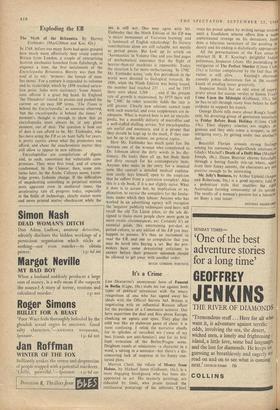It's a Crime
LEN DEIGHTON'S anonymous hero of Funeral in Berlin (Cape, 18s.) stubs his toe against both types of political extremism with the weary resignation of one who has signed away his ideals with the Official Secrets Act. Britain is negotiating with an influential Russian officer for the purchase of a Communist scientist. Our hero supervises the deal and flies about Europe, checking on agents and spies. They play the cold war like an elaborate game of chess: it is most confusing. I relish the narrative chiefly for its splashes of succulent wit ('some of my best friends are anti-Semites) and for its bril- liant evocation of the Berlin/Prague scene. Deighton excels at miniatures—a character in a word, a setting in a sentence—but there's a dis- concerting lack of suspense in his funny con- torted plots.
Mervyn Cheel, the villain of Money from Holme, by Michael Innes (Gollancz, 16s.), is a most engaging blackguard who has been dis- appointed in art. His masterly paintings are ridiculed by fools, who praise instead the mechanical posturings of his inferiors. Cheel
vents his proud spleen by writing savage reviews until a fraudulent scheme offers him a more sophisticated revenge on his detractors. trines does a hilarious caricature of the painting in' dustry and his ending is diabolically appropriate.
All the prevarications of the East come to obstruct H. R. F. Keating's delightful Indian policeman, Inspector Ghote. His painstaking in• vestigation of The Perfect Murder (Crime Club, 15s.) is further complicated by the fact that the victim is still alive. . . . Keating's charming comedy pokes affectionate fun at the eastern knack of evading issues gracefully.
Inspector Smith has an odd sense of imps priety about the suicide verdict in Simon Troy's Cease Upon the Midnight (Gollancz, 15s.), but he has to sift through many lives before he finds evidence to support his hunch.
George Davis tells more about Roag's Synd!' cate, his diverting group of gentlemen swindlers, in Friday Before Bank Holiday (Crime Club, 15s.). Their slippery schemes are mighty in• genious and they only come a cropper, in this intriguing story, by getting under one another's feet.
Beautiful Florian arouses strong feelings among his mercenary Anglo-Dutch relations, in Gladys Mitchell's Death of a Delft Blue (Michael Joseph, 18s.). Dame Beatrice cleaves forcefullY through a boring family mix-up where, apart from their funny accents, the characters are not positive enough to be interesting.
Mr. Jelly's Business, by Arthur Upfield (Anglo and Robertson, 16s.) is a good mystery, told in a pedestrian style that matches the rigid Austrialian farming community of its setting. The results of a woman's passion for a labourer set Bony a real teaser.




























 Previous page
Previous page